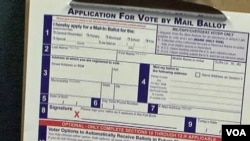North Dakota officials will tabulate results Tuesday from an election conducted exclusively by mail, a test of whether Gov. Doug Burgum's pockets are deep enough to decide an unusually rough primary for state treasurer and oust a fellow Republican who has been the first-term governor's biggest irritant in the Legislature.
All 53 counties chose to avoid in-person voting due to the coronavirus. With the post office playing its biggest role for an election in state history, about 137,000 ballots were returned by midday Monday — the day they were due. They'll be counted starting at 7 p.m. Tuesday.
Burgum's big-money drive to install allies in the Legislature and the state treasurer's office provided some intrigue to an otherwise low-key election with no other competitive primaries for statewide office or any statewide ballot measures. Burgum himself faced a primary challenge from Michael Coachman, a retired Air Force veteran who has run several statewide campaigns before.
Burgum, a former software executive, has given $1.85 million to a political action campaign that is largely focused on unseating GOP House Appropriations Chairman Jeff Delzer, who has clashed with Burgum over policy and spending priorities.
With Burgum's money, the Dakota Leadership PAC has raised well over $2 million, much of it from out-of-state donors, filings show.
That's helped fund a blitz of mail, television and online ads aimed at ousting Delzer, and his support for political newcomers David Andahl and Dave Nehring, for two seats in the district; one is occupied by Delzer, the the other was left open due to the retirement of Republican Vernon Laning.
Burgum also is backing Fargo businessman and GOP Rep. Thomas Beadle for treasurer against Rep. Daniel Johnston, who is seen as a member of the far-right wing of the Republican-controlled Legislature that has been critical of the governor. Johnston has gotten support from North Dakota U.S. Sen. Kevin Cramer and President Donald Trump.
North Dakota Democrats have one declared candidate for the treasurer's job, Bismarck's Mark Haugen. He has run unsuccessfully three times for a legislative seat.
The state treasurer collects some state fees and taxes and distributes money to local governments. It's the smallest state office headed by an elected official, but the treasurer also sits on powerful state boards that manage state investments and land holdings. The office has survived numerous attempts over the years to abolish it and distribute its duties among other agencies.
Beadle was one of 18 lawmakers in 2017 who supported a move to dissolve the office. GOP incumbent Kelly Schmidt did not run for re-election and is supporting Johnston.
Separately, Burgum has contributed $100,000 to his own campaign so far and $42,000 to about 20 GOP incumbent and first-time legislative candidates, filings show.
Twenty-three of North Dakota's 47 legislative districts have House and Senate races this year. Each district is represented by two House members and a senator.
North Dakota Republicans control both houses of the Legislature. They have 37 Senate seats to Democrats' 10, and 79 House seats to Democrats' 15.
Democrats are not fielding candidates for seven House seats and seven Senate seats. Republicans lack a candidate only for the House seat for north Fargo's District 44, held by Democrat Karla Rose Hanson.
North Dakota has no voter registration. Turnout is calculated by comparing the number of voters to an estimate of the state's voting-age population, or about 582,000 people, which would equal about 23% and about average for a June primary.
North Dakota's All-Mail Primary a Test of Burgum's Big Bucks




